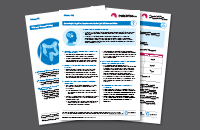 Full Guidelines
Full Guidelines
Click here to view article

 Tools
Tools


 Additional Documents
Additional Documents
Click here to see additional documents

 Endorsements
Endorsements
This Clinical Practice Guideline has been endorsed by the Nurse Practitioners’ Association of Canada (NPAC).
This Clinical Practice Guideline has been endorsed by the Canadian Association of Midwives/Association canadienne des sages-femmes (CAM/ACSF).
This Clinical Practice Guideline has been endorsed by the Canadian Association of Perinatal and Women’s Health Nurses (CAPWHN).
This clinical practice guideline has been endorsed by the Society of Obstetricians and Gynaecologists of Canada (SOGC).
This Clinical Practice Guideline has been endorsed by the College of Family Physicians of Canada.

 Calculate by QxMD
Calculate by QxMD
This guideline and KT tool(s) are available on QxMD. Click here to download the app.
Summary of recommendations for clinicians and policy-makers
Recommendations were based on the overall balance between possible benefits and harms of screening, weighing the potential benefits against any harms.
Overall, very low-quality evidence from four cohort studies (n=7,611) was found for the benefits and harms of screening for asymptomatic bacteriuria (ASB) in pregnancy. There were few events, effect estimates were highly imprecise and we are uncertain about the benefits and harms of screening. Linked evidence for screening that considers the effectiveness of antibiotic treatment for screen-identified women was also low-quality and suggested that treatment modestly reduces the incidence of pyelonephritis and the number of low birth weight infants. It is a longstanding practice in Canada to provide routine screening and treatment of asymptomatic bacteriuria in pregnancy, and this may contribute to the apparently low prevalence of pyelonephritis among pregnant women in Canada. In the judgement of the task force, the potential benefits of screening outweigh possible harms, and a weak recommendation in favor of screening is warranted. This recommendation places a relatively higher priority on the small but uncertain benefit of screening for asymptomatic bacteriuria and a relatively lower priority on the lack of evidence regarding serious harms associated with antibiotic use for pregnant women and their babies.
The CTFPHC will continue to carefully monitor scientific developments in screening for ASB which may impact on these recommendations.
Recommendation
- We recommend screening pregnant women once during the first trimester with urine culture for asymptomatic bacteriuria
(weak recommendation; very low-quality evidence).
This recommendation applies to pregnant women who are not experiencing symptoms of a UTI and are not at increased risk for asymptomatic bacteriuria.
This weak recommendation in favour of screening for asymptomatic bacteriuria in pregnancy recognizes that some women who are not at increased risk of asymptomatic bacteriuria in pregnancy and are more concerned with potential harms of antibiotics may choose not to be screened or treated for asymptomatic bacteriuria. In such circumstances, there is potential value for discussion between clinicians and patients in order to reach evidence informed and values based decisions. This guideline does not apply to women at increased risk of asymptomatic bacteriuria in pregnancy who should follow guidance for higher risk populations.
Additional Documents
- Clinician Summary
- Excluded Studies (pdf)
- Protocol (pdf)
- Full Systematic Review and Appendices (pdf)
- Published Systematic Review (BMJ Open 2019;9: e021347)
- CMAJ Author Podcast
- Guideline Presentation
ECRI Evaluation Scores
ECRI Guidelines Trust scores guidelines based on their adherence to the National Academy of Medicine Standards for Trustworthy Guidelines. Find the ECRI evaluation scores for this guideline here.








